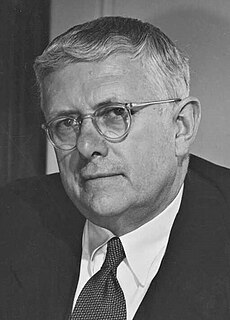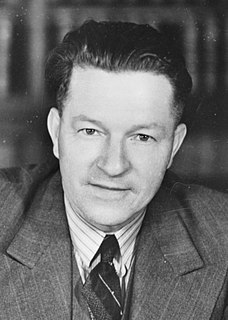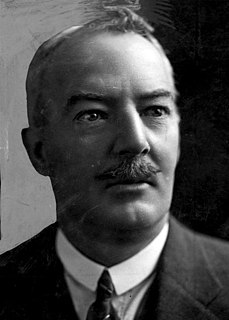
Francis Michael Forde was an Australian politician who served as prime minister of Australia from 6 to 13 July 1945. He was the deputy leader of the Australian Labor Party (ALP) from 1932 to 1946. He served as prime minister in a caretaker capacity after the death of John Curtin, and is the shortest-serving prime minister in Australia's history.

Arthur Augustus Calwell KCSG was an Australian politician who served as the leader of the Labor Party from 1960 to 1967. He led the party to three federal elections.

Herbert Vere Evatt, was an Australian politician and judge. He served as a judge of the High Court of Australia from 1930 to 1940, Attorney-General and Minister for External Affairs from 1941 to 1949, and leader of the Australian Labor Party (ALP) and Leader of the Opposition from 1951 to 1960.

The deputy prime minister of Australia is the deputy chief executive and the second highest ranking officer of the government of Australia. The office of deputy prime minister was officially created as a ministerial portfolio in 1968, although the title had been used informally for many years previously. The deputy prime minister is appointed by the governor-general on the advice of the prime minister. When Australia has a Labor government, the deputy leader of the parliamentary party holds the position of deputy prime minister. When Australia has a Coalition government, the Coalition Agreement mandates that all Coalition members support the leader of the Liberal Party becoming prime minister and mandates that the leader of the National Party be selected as deputy prime minister.

Edward John Ward was an Australian politician who represented the Australian Labor Party (ALP) in federal parliament for over 30 years. He was the member for East Sydney for all but six-and-a-half weeks from 1931 until his death in 1963. He served as a minister in the Curtin and Chifley Governments from 1941 to 1949, and was also known for his role in the ALP split of 1931.

Edward James "Jack" Holloway was an Australian politician who served in the House of Representatives from 1929 to 1951, representing the Labor Party. He served as a government minister under James Scullin, John Curtin, Frank Forde, and Ben Chifley.

Allan Duncan Fraser was an Australian politician and journalist. He served as a member of the House of Representatives from 1943 to 1966 and from 1969 to 1972, representing the Division of Eden-Monaro for the Labor Party.

Joseph Francis Fitzgerald was an Australian politician. He was an Australian Labor Party member of the Australian House of Representatives for the Sydney seat of Phillip from 1949 to 1955 and a member of the Australian Senate for New South Wales from 1961 to 1974.

A leadership spill occurred in the Australian Labor Party on 24 June 2010. Kevin Rudd, the prime minister of Australia, was challenged by Julia Gillard, the deputy prime minister of Australia, for the leadership of the Australian Labor Party. Gillard won the election unopposed after Rudd declined to contest, choosing instead to resign. Gillard was duly sworn in as prime minister by Quentin Bryce, the Governor-General, on 24 June 2010 at Government House, becoming Australia's first female prime minister.

The Chifley Government was the federal executive government of Australia led by Prime Minister Ben Chifley. It was made up of members of the Australian Labor Party in the Australian Parliament from 1945 to 1949.

A leadership spill in the Australian Labor Party, the party of government in the Parliament of Australia, was held on 21 March 2013. Prime Minister Julia Gillard called a ballot for the Leadership and Deputy Leadership of the Labor Party for 4.30pm, following a press conference by former Labor Leader and Regional Minister Simon Crean over persistent leadership tensions. At the caucus meeting, no alternative candidates nominated for the positions, and so Gillard and Wayne Swan were re-elected unopposed.

A leadership ballot in the Australian Labor Party, the opposition party in the Parliament of Australia, was held on 7 March 1960. It followed the retirement of previous leader H. V. Evatt. Calwell received 42 votes to Reg Pollard's 30 in a caucus ballot. Future Prime Minister Gough Whitlam would defeat Eddie Ward to become Calwell's deputy.

A leadership spill of the Australian Labor Party (ALP), then the opposition party in the Parliament of Australia, was rejected on 21 October 1954.

A leadership spill of the Australian Labor Party (ALP), then the opposition party in the Parliament of Australia, was held on 16 February 1956.

The Australian Labor Party held a leadership election on 12 July 1945, following the death of Prime Minister John Curtin. Treasurer Ben Chifley won an absolute majority on the first ballot, defeating three other candidates: deputy leader and interim prime minister Frank Forde, navy minister Norman Makin, and attorney-general H. V. Evatt.

The Australian Labor Party held a leadership election on 2 March 1931, in the context of the developing party split. Prime Minister James Scullin was easily re-elected, defeating Jack Beasley of the Lang Labor faction.
The leader of the National Party of Australia is elected by majority vote of the federal parliamentary party. A deputy leader is elected in the same fashion. The party's longest-serving leader is Earle Page, who held the office from 1921 to 1939. It is historically rare for the incumbent leader and deputy leader to be opposed in a bid for re-election. In every instance when an incumbent leader retires he is always succeeded by his deputy. With the exception of the election of Ian Sinclair in 1984, every one of these deputy leaders ascended to the leadership unopposed.

The Australian Labor Party held a leadership election on 16 May 1922, following the death of Frank Tudor. The party elected Matthew Charlton as its new leader.

A leadership spill of the Australian Labor Party (ALP), then the opposition party in the Parliament of Australia, was held on 16 February 1959.

A leadership election was held in May 2019 to determine the successor to Bill Shorten as leader of the Australian Labor Party and Leader of the Opposition. Shorten announced his pending resignation on 18 May, following Labor's surprise defeat in the 2019 federal election. The leadership was confirmed unopposed; Anthony Albanese was elected as Leader, with Richard Marles elected Deputy Leader.














